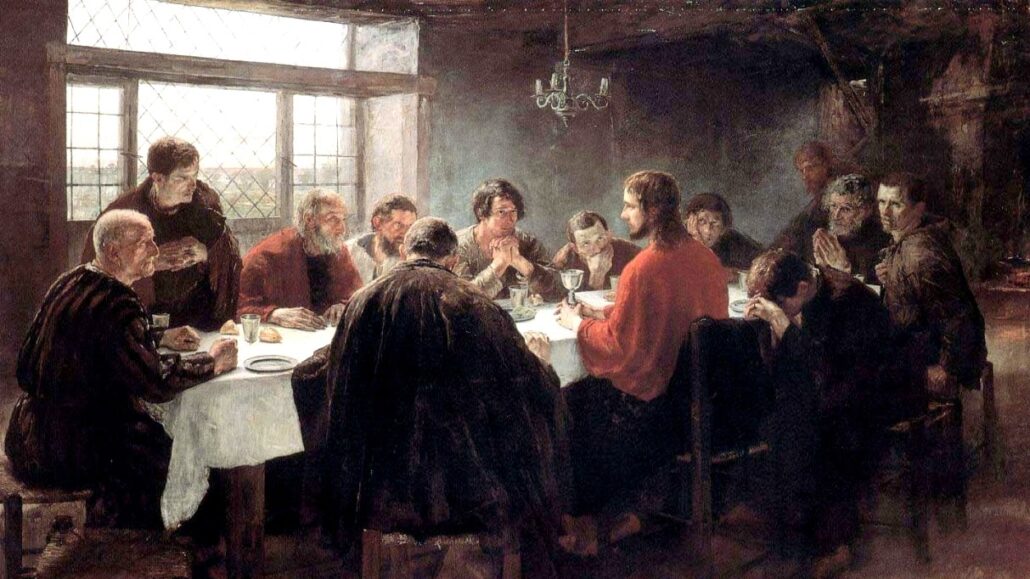Many people find Jesus’ choice of his apostles curious. Why did he choose them in the first place? A cynic might think he could have done better blindfolded. The account of Jesus’ selection of his apostles as related in the Gospel of Luke (6:12-19) contains a lot of details about this important event. In fact, it tells us a lot of about Jesus himself at that moment.
Prior to this incident, Jesus had attracted lots of attention as he moved through Galilee teaching, healing and casting out demons. We hear expressions like, “People were amazed.” They commented to each other that he spoke with authority. Yet, when it came to healings and casting out demons, Jesus never yelled as some healers did. There was a quietness about him that drew people to him. But one thing they also saw was his humanness. He was not like some religious leaders who tried to impress people. Jesus was strong, but never mean-spirited.
We know that, early on in his ministry, Jesus cured Peter’s mother-in-law of a fever. And shortly after that, Jesus called Peter to come after him following the miracle of the great catch of fishes. We know Jesus had other followers who were attracted by him and by what he was doing. We don’t know how many, but it was enough to cause the Pharisees concern.
There came the time when Jesus made one of his many decisions in his public ministry. The Good News was catching on as people began to listen and, more importantly, understand what he was saying. But in simple terms, Jesus needed help in his ministry. Some might wonder why he would need help since he was God in the flesh. Couldn’t he do anything he wanted? Not really. He was, indeed, “in the flesh.” That meant that on this earth, before his resurrection, Jesus was bound like you and me by the laws of nature. He could only be in one place on earth at a time.
After his resurrection and because of his glorified body, we know he was seen by many people in many different places at the same time. But, prior to that, Jesus could only go to one city at a time. So he needed to choose others to help him. They would be the ones who would stay with him, witness his miracles and spend time with him.
It was an important decision for Jesus. This was the time that Jesus’ ministry would spread across the territory; he would send his apostles out, two-by-two, to preach his simple message, teach the people and then heal in ways they could not have imagined.
Jesus’ Preparation for His Choices
What did Jesus do? He spent the night in prayer with the Father. It was not that the Father told him whom to choose. It was time when he knew something new would be happening in his ministry. And so prayer—union with the Father—is what he wanted. Jesus went up a mountain to pray and, in the Old Testament, the image of a person going up the mountain was a way of expressing a person going to meet God, just as Moses did on Mount Sinai.
Jesus came down the mountain and made his choice of 12 men from all the disciples gathered around him. Jesus chose Peter first of all. In the Gospels, Peter is always listed first, always seen as the leader and the apostle who often spoke for the others. It is worth noting that Peter often suffers from “foot-in-mouth disease”: speaking when silence would be better.
The group that Jesus chose was a motley group indeed. What a variety of personalities! Peter, the outspoken one; James and John, short on patience and nicknamed the “sons of thunder,” ready to call devastation down on a Samaritan town because the people would not permit Jesus to pass through. There was Matthew, the former tax collector, considered a traitor to the Jews since tax collectors worked for the Romans. There was Simon the Zealot. Zealots were rebels at heart, hated the Romans and wanted the Romans thrown out of Palestine. It would have been easy for Simon to dream about having Jesus’ power to use against their occupiers.
And, finally, there was Judas. Why Judas? Some say Jesus must have known that Judas would betray him. In his human nature, Jesus walked in faith and trust in doing the Father’s will in all things. At that moment he must have seen in Judas potential as an apostle as he did with all the 12. Even though Jesus was God in the flesh, he was “like us in all things save sin.” Jesus also walked in faith, and he met the circumstances of his life with that attitude. It must have hurt Jesus terribly when Peter denied him, his apostles abandoned him and Judas betrayed him.
The 12 Had Lots to Learn
All through the Gospels, these 12 were not stellar followers. They were slow to grasp Jesus’ message; they were impatient with Jesus; they had their own agendas; they argued among themselves. And we can imagine how frustrating it must have been for Jesus to put up with some of their antics. Yet these were the ones he picked. And, in the end, these men would become heroes. In time, they all realized they could do nothing but open themselves up to the resurrection and the power of the Spirit at Pentecost. In the end, they died martyrs for their faith in Jesus.
All except Judas. We read that he despaired of his betrayal and hanged himself. Yet, what is interesting is that the Church has never ever said that any particular person is in hell—even Judas. Why not? Because only God can know the final destiny of a person. In the last second of his life, could not Judas also have repented? Actually, taking his own life might have been a sign of his repentance. No one but God knows.
There is a beautiful story—fictional, of course—but still thought-provoking: After Jesus’ death and burial, two disciples were walking to recover the body of Judas. They were talking about what Judas had done. One of them became angry and said to the other, “Why in the world are we bothering with Judas after what he did?” The other thought for a moment and said, “It’s what the Lord would have wanted us to do. After all, did we not abandon the Lord in his last hour?”
It is part of our Christian faith that we need not give up on anyone (including ourselves) when Jesus is concerned.







